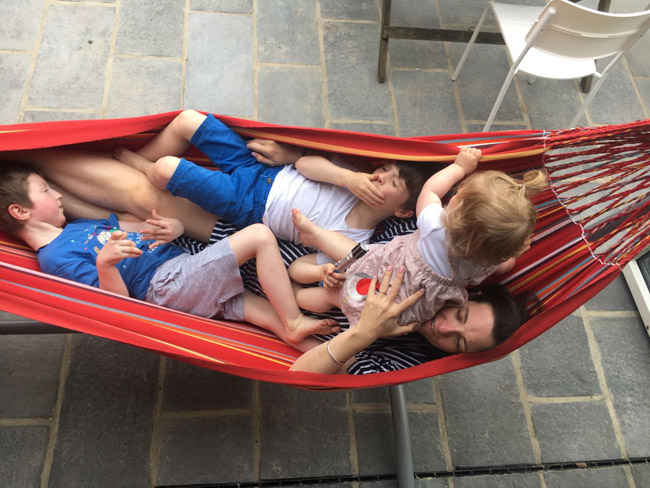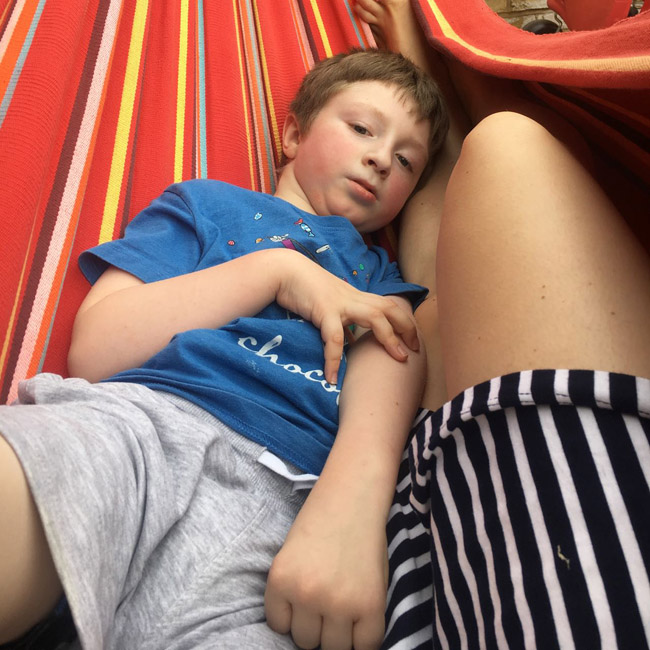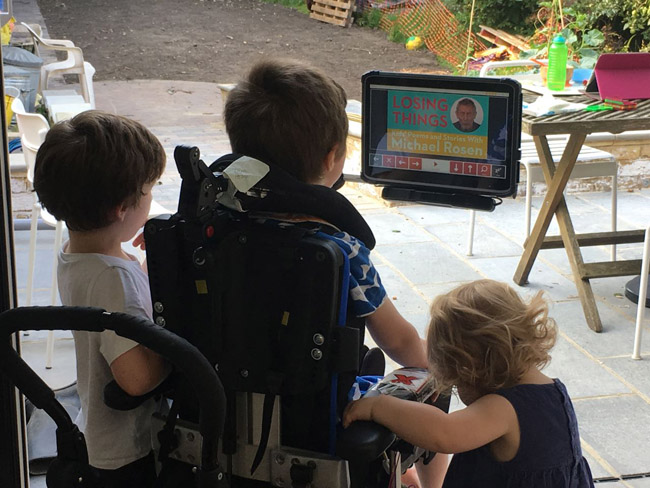
One of the main things about having kids is how much they touch you – from months of carrying around a baby, possibly breastfeeding them, to years of having a child on your lap and a snotty nose wiped on your arm. It can feel like near constant touching. Of smooth baby skin smelling of milk, of small fingers squeezing you, of hands whacking you in the face.
The physical relationship between a parent and a kid is so unselfconscious and incredibly lovely. Molly is just learning how to kiss and when she hasn’t seen me for a while she will come to give me a cuddle and then repeatedly touch her cheek and mouth to my lips. It is delightful. As Max has got older there are less frequent but more prized requests for a cuddle, and I will never say no.
When you raise a small child, you get to know their body so well that not only do you know what it feels like, but you also know how it moves. If I see Max walking down the road, I know if he is happy or sad. If James sends me a photo of one of the kids where you can’t see their face clearly, I’ll probably be able to tell what kind of mood they were in.
In some ways I know Ben’s body better than my other kids. Max and Molly can choose to walk away from me, or to move their body in almost any way they like. If Ben is sitting on my lap, he will be there for as long as I choose (though of course he can make clear whether he is enjoying it or not). While he is sitting on me, I will be supporting him. Both James and I have been doing this for so long we couldn’t now describe what we are doing, but we use our arms, legs, torso and head to mimic a seat, to find a comfortable way for us both to be within the whirl of Ben’s ever moving body. Sometimes it’s not easy, but in this we join a long list of parents prioritising providing comfort to their child over backache.

When Ben was little, we would spend hours holding him and rocking him in a figure-of-eight pattern, to ease the pain of reflux or to calm him sufficiently for him to sleep. These days he’s way too big for that and he spends more time sitting in a specialist chair, with us nearby. It is a less intimate physical connection but still one within which I know his body. The nature of Ben’s disability means he moves a lot, and has limited volitional control over the movements, but within the apparent flurry of limbs there is meaning.

Ben’s often communicates his emotions by making noises – there are different kinds of sounds for happy, sad, interested, annoyed. But even without the noises, just from the way he is moving his body I could tell you whether he’s in pain or just bored. I could tell you whether Ben’s excited or frustrated. Not always, but often.
Sometimes Ben’s body needs to be moved in ways that it does not do easily. I know how to play his limbs, how to bend his knee and turn his foot in just the right way to get his shoe on properly without hurting his toes. I know what kinds of movement he likes, and what he will find irritating (and therefore which TV programme will distract him, if it needs to be done).
His is a body that can frustrate him and be difficult for others to manage. His is a body about which there are meetings held and training delivered to consider ‘health and safety’. But this body of his, which some people may see as inferior or less desirable, is actually something of real value. In the absence of being able to talk, his body can tell the story. In the same way that I can sometimes tell from the particular sound of his cough whether he needs to see a GP, I will be able to tell a therapist whether he is in pain or not from the particular way he moves his pelvis.
I treasure this knowledge I have. That even when my relationship with him, with all my kids as they grow up, is becoming less physical in the every day, that I still know these bodies. They are not mine – I am just nurturing them until they can look after themselves. But as the days of holding newborns recede, there is no absence of the raw physicality of touch, and the accumulated knowledge of knowing how these bodies work. It is an absolute privilege.

Great post. My son was and still is physically challenged. He can walk with aids or a helping hand but still struggles to get about. The way you’ve described the connection you have with your son was something special. We do know our kids so well that we can tell in an instant when they’re unhappy or uncomfortable but few of us can write about it so eloquently.
LikeLike